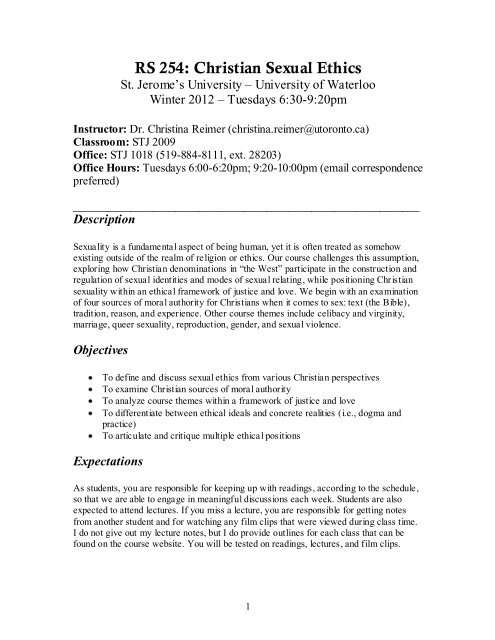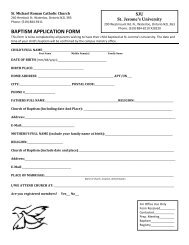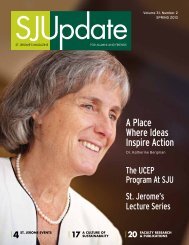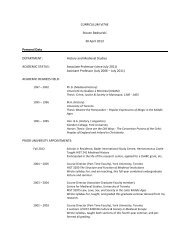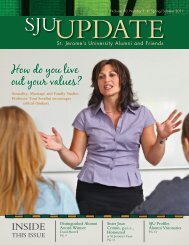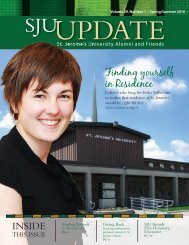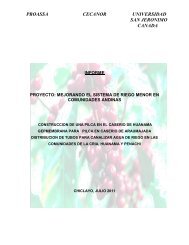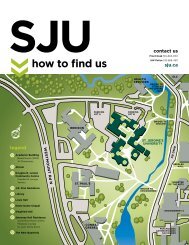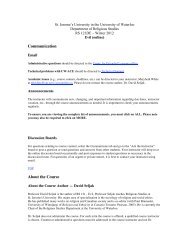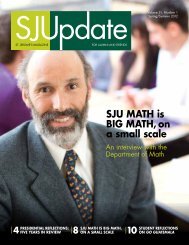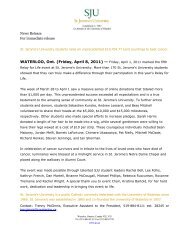course outline - St. Jerome's University
course outline - St. Jerome's University
course outline - St. Jerome's University
You also want an ePaper? Increase the reach of your titles
YUMPU automatically turns print PDFs into web optimized ePapers that Google loves.
RS 254: Christian Sexual Ethics<strong>St</strong>. Jerome’s <strong>University</strong> – <strong>University</strong> of WaterlooWinter 2012 – Tuesdays 6:30-9:20pmInstructor: Dr. Christina Reimer (christina.reimer@utoronto.ca)Classroom: STJ 2009Office: STJ 1018 (519-884-8111, ext. 28203)Office Hours: Tuesdays 6:00-6:20pm; 9:20-10:00pm (email correspondencepreferred)_____________________________________________________________DescriptionSexuality is a fundamental aspect of being human, yet it is often treated as somehowexisting outside of the realm of religion or ethics. Our <strong>course</strong> challenges this assumption,exploring how Christian denominations in “the West” participate in the construction andregulation of sexual identities and modes of sexual relating, while positioning Christiansexuality within an ethical framework of justice and love. We begin with an examinationof four sources of moral authority for Christians when it comes to sex: text (the Bible),tradition, reason, and experience. Other <strong>course</strong> themes include celibacy and virginity,marriage, queer sexuality, reproduction, gender, and sexual violence.ObjectivesTo define and discuss sexual ethics from various Christian perspectivesTo examine Christian sources of moral authorityTo analyze <strong>course</strong> themes within a framework of justice and loveTo differentiate between ethical ideals and concrete realities (i.e., dogma andpractice)To articulate and critique multiple ethical positionsExpectationsAs students, you are responsible for keeping up with readings, according to the schedule,so that we are able to engage in meaningful discussions each week. <strong>St</strong>udents are alsoexpected to attend lectures. If you miss a lecture, you are responsible for getting notesfrom another student and for watching any film clips that were viewed during class time.I do not give out my lecture notes, but I do provide <strong>outline</strong>s for each class that can befound on the <strong>course</strong> website. You will be tested on readings, lectures, and film clips.1
Texts1. Coursepack: Christian Sexual Ethics (2012). Available at the <strong>University</strong> of WaterlooBookstore.2. Additional online texts available through links on the <strong>course</strong> website:http://uwace.uwaterloo.caEvaluationMidterm Test (30%)Ethical Position Essay (30%)Final Exam (40%)Course RequirementsMidterm Test (identification, short answer)This test will take place in the first 1.5 hours of class. It will cover the readings, lecturesand film clips from the first five lectures (intro, methods, text, tradition, and reason).Ethical Position Essay (8-10 pages, double-spaced, 12 pt font size) DUE MARCH 6thThis paper should be done in the style of an expository essay, meaning it requires that thestudent articulate a concise argument guided by a clear thesis statement on one of the<strong>course</strong> themes. Comparing and contrasting multiple ethical perspectives is expected. Thisessay must be submitted to Turnitin.com (see note below) before midnight on the duedate. HARDCOPIES OF ESSAYS MUST BE HANDED IN AT THE BEGINNINGOF LECTURE. No electronic copies will be accepted.Final Exam (identification, short answer, essay)This exam will take place during the exam period and will be 2.5 hours in length. It willcover readings, lectures and films from lectures six through twelve. It will NOT cover thesame material as the midterm._____________________________________________________________Important InformationTurnitin.comPlagiarism detection software (Turnitin) will be used to screen assignments in this <strong>course</strong>.This is being done to verify that use of all material and sources in assignments isdocumented. In the first week of the term, details will be provided about thearrangements for the use of Turnitin in this <strong>course</strong>. Note: students must be given areasonable option if they do not want to have their assignment screened by Turnitin. Seehttp://uwaterloo.ca/academicintegrity/Turnitin/index.html for more information.2
Course Website InformationANGEL is a web-based <strong>course</strong> management system that enables instructors to manage<strong>course</strong> materials (syllabus, lecture <strong>outline</strong>s, etc.), interact with their students (drop boxesfor student submissions, announcements, email, etc), and provide feedback (grades, etc).The degree to which UW-ACE is utilized in a particular <strong>course</strong> is left to the discretion ofthe instructor; therefore, you may find significant differences from one <strong>course</strong> to another.To logon, go to http://uwace.uwaterloo.caElectronic GadgetsPlease turn off your cellphones, and/or any other electronic devices before entering theclassroom. Laptops and PDAs with keyboards may be used, but only to take classnotes.Those who use cellphones, laptops, PDAs, or other devices to communicate with the“outside world” will be asked to leave class.Classroom EthicsOur class topics are often of a controversial nature and we should not expect thateveryone in the class shares the same opinion, life experience, religion, or sexualorientation. Therefore, all class discussions will be guided by mutual respect and anopenness to the viewpoints of others. As the instructor, I reserve the right to end any lineof discussion that I deem inappropriate, offensive or unedifying.Correspondence<strong>St</strong>udents using email to contact me must include their first and last names, studentnumber, and <strong>course</strong> in which they are enrolled in the email subject line. Please use onlychristina.reimer@utoronto.ca to contact me via email. I rarelycheck the <strong>course</strong> website email folder. Furthermore, I am only in Waterloo on Tuesdayevenings, therefore my office phone messages will only be checked on Tuesday beforeclass.UW Policies and Academic Integrity (aka CHEATING!!!)UW Policy Regarding Illness and Missed TestsThe <strong>University</strong> of Waterloo Examination Regulations(www.registrar.uwaterloo.ca/exams/ExamRegs.pdf) state that:A medical certificate presented in support of an official petition for relief fromnormal academic requirements must provide all of the information requested onthe “<strong>University</strong> of Waterloo Verification of Illness” form or it will not be accepted.This form can be obtained from Health Services or atwww.healthservices.uwaterloo.ca/Health_Services/verification.html.If a student has a test/examination deferred due to acceptable medical evidence,he/she normally will write the test/examination at a mutually convenient time, tobe determined by the <strong>course</strong> instructor.The <strong>University</strong> acknowledges that, due to the pluralistic nature of the <strong>University</strong>community, some students may on religious grounds require alternative times to3
write tests and examinations.Elective arrangements (such as travel plans) are not considered acceptable groundsfor granting an alternative examination time.Academic IntegrityIn order to maintain a culture of academic integrity, members of the <strong>University</strong> ofWaterloo and its Federated <strong>University</strong> and Affiliated Colleges are expected to promotehonesty, trust, fairness, respect and responsibility.DisciplineAll students registered in <strong>course</strong>s at <strong>St</strong>. Jerome’s <strong>University</strong> are expected to know whatconstitutes academic integrity, to avoid committing academic offences, and to takeresponsibility for their actions. A student who is unsure whether an action constitutes anoffence, or who needs help in learning how to avoid offences (e.g., plagiarism, cheating)or about “rules” for group work/collaboration should seek guidance from the <strong>course</strong>professor, academic advisor, or the Associate Dean. When misconduct has been found tohave occurred, disciplinary penalties will be imposed under <strong>St</strong>. Jerome’s <strong>University</strong>Academic Discipline Policy and UW Policy 71 – <strong>St</strong>udent Discipline. For information oncategories of offenses and types of penalties, students should refer to Policy 71 - <strong>St</strong>udentDiscipline, www.adm.uwaterloo.ca/infosec/Policies/policy71.htm.GrievanceA student who believes that a decision affecting some aspect of his/her university life hasbeen unfair or unreasonable may have grounds for initiating a grievance. In such a case,contact the <strong>St</strong>. Jerome’s <strong>University</strong> Grievance Officer. Read <strong>St</strong>. Jerome’s <strong>University</strong>Handbook, Section 4, item 8,www.sju.ca/faculty_staff/SJU_handbook/grievance_policy.html (under revision).AppealsA student may appeal the finding and/or penalty in a decision made under <strong>St</strong>. Jerome’s<strong>University</strong> Academic Discipline Policy or Grievance Policy if a ground for an appeal canbe established. In such a case, contact the <strong>St</strong>. Jerome’s <strong>University</strong> Appeals Officer. Read<strong>St</strong>. Jerome’s <strong>University</strong> Handbook, Section 6.4,www.sju.ca/faculty/SJU_handbook/examinations_grades_standings_and_appeals.html(under revision).Academic Integrity website (Arts)http://arts.uwaterloo.ca/arts/ugrad/academic_responsibility.htmlAcademic Integrity Office (UW)http://uwaterloo.ca/academicintegrity/Note for students with disabilitiesThe Office for Persons with Disabilities (OPD), located in Needles Hall, Room 1132,collaborates with all academic departments to arrange appropriate accommodations forstudents with disabilities without compromising the academic integrity of the curriculum.4
If you require academic accommodations to lessen the impact of your disability, pleaseregister with the OPD at the beginning of each academic term.Reading and Lecture Schedule1. January 3: INTRODUCTIONNo Reading2. January 10: METHODSReading: “Framework for a Sexual Ethic” by Margaret A. Farley (Coursepack)3. January 17: TEXTReadings: 1. Genesis 2-3 (online at http://www.devotions.net/bible/00bible.htm)2. “Depatriarchalizing in Biblical Interpretation” by Phyllis Trible (Course Reserves)3. 1 Corinthians 6-8; 12-14 (online at http://www.devotions.net/bible/00bible.htm)4. “New Testament Sexual Ethics Today” by Will Countryman (Coursepack)4. January 24: TRADITIONReading: “On Marriage and Concupiscence, Book I” (Chs 3-28) by Augustine ofHippo (online at http://www.newadvent.org/fathers/15071.htm)5. January 31: REASONReadings: 1. Summa Theologica, Second Part of the Second Part, (Question 153,article 2; Question 154 articles 2 and 4) by Thomas Aquinas(online at http://www.newadvent.org/summa/3.htm)2. “An Answer to the Question: What is Enlightenment?” by Immanuel Kant(Coursepack)3. “Duties Toward the Body in Respect of Sexual Impulse” by Immanuel Kant(Coursepack)4. “<strong>St</strong>ar Trek and the Postmodern Generation” by <strong>St</strong>anley Grentz (Coursepack)6. February 7: TEST and FILMNo Readings7. February 14: CELIBACY and VIRGINITYReadings: 1. “Later Christianity: Celibacy and Clerics” by Elizabeth Abbott(Coursepack)2. “Virgins for Jesus” by Heather Hendershot (Coursepack)8. February 21: READING WEEK – NO CLASS9. February 28: MARRIAGEReadings: 1. “Papal Ideal, Marital Realities” by Cristina L. H. Traina (Coursepack)2. “A Queer Fidelity” by W. Scott Haldeman (Coursepack)5
10. March 6: QUEER SEXUALITY – ESSAY DUE!!!!Readings: 1. “What if it is a Choice?” by Laurel L. Schneider (Coursepack)2. “Holiness Codes and Holy Homosexuals” by Heather Hendershot (Coursepack)11. March 13: REPRODUCTIONReadings: 1. “Is There Life After Roe?” by Frances Kissling (Coursepack)2. “Embryos and Ethics” by James B. Nelson (Coursepack)12. March 20: GENDERReadings: 1. “Woman, Body and Nature” by Rosemary Radford Ruether(Coursepack)2. “The Erosion of Sexual Dimorphism” by Christine Gudorf (Coursepack)13. March 27: SEXUAL VIOLENCEReadings: 1. “Ties that Bind” by Elisabeth Schüssler Fiorenza (Coursepack)2. “Pain Flows from the Source of Power” by Michael Kaufman (Coursepack)6


